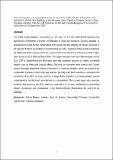Files in this item
The duplicity of the European Union Common Fisheries Policy in third countries : evidence from the Gulf of Guinea
Item metadata
| dc.contributor.author | Okafor-Yarwood, Ifesinachi | |
| dc.contributor.author | Belhabib, Dyhia | |
| dc.date.accessioned | 2020-10-18T23:39:06Z | |
| dc.date.available | 2020-10-18T23:39:06Z | |
| dc.date.issued | 2020-02-01 | |
| dc.identifier | 267797583 | |
| dc.identifier | 1f1a4855-18c3-40ff-990b-1ba5e2d45e42 | |
| dc.identifier | 85073833033 | |
| dc.identifier.citation | Okafor-Yarwood , I & Belhabib , D 2020 , ' The duplicity of the European Union Common Fisheries Policy in third countries : evidence from the Gulf of Guinea ' , Ocean and Coastal Management , vol. 184 , 104953 . https://doi.org/10.1016/j.ocecoaman.2019.104953 | en |
| dc.identifier.issn | 0964-5691 | |
| dc.identifier.uri | https://hdl.handle.net/10023/20798 | |
| dc.description | Belhabib would like to thank I-Sea Fisheries Project at Ecotrust Canada, funded by the Paul M. Angell Family Foundation. | en |
| dc.description.abstract | The 1982 United Nations Convention on the Law of the Sea (UNCLOS) espouses the significance of fisheries and their contribution to food and economic security globally. It emphasises the need for the conservation of the ocean and the integrity of marine resources in the interest of future generations. Demonstrating an understanding of the need to implement the UNCLOS, the European Union (EU) introduced a Common Fisheries Policy (CFP) in 1983, later revised in 2013 effective from 2014. This paper discusses how the implementation of the EU's CFP is undermining the long-term food and economic security of highly vulnerable regions such as West and Central Africa. Focusing on examples from Liberia and Guinea Bissau, the paper elaborates further on how the EU fisheries subsidies, which are central to its Sustainable Fisheries Partnership Agreements (SFPA) with third countries, contradict the provisions of its CFP, as they continue to target fully exploited and overexploited species notwitstanding the declared commitment to sustainability. The current paper also provides evidence that uncovers the EU's selective application of its own regulations on preventing Illegal, Unreported and Unregulated (IUU) fishing thereby illuminating the extent of its duplicity. | |
| dc.format.extent | 11 | |
| dc.format.extent | 413758 | |
| dc.language.iso | eng | |
| dc.relation.ispartof | Ocean and Coastal Management | en |
| dc.subject | EU Common Fisheries Policy | en |
| dc.subject | Fisheries conflict | en |
| dc.subject | Gulf of Guinea | en |
| dc.subject | IUU regulation | en |
| dc.subject | Maximum sustainable yield | en |
| dc.subject | GC Oceanography | en |
| dc.subject | HD28 Management. Industrial Management | en |
| dc.subject | Oceanography | en |
| dc.subject | Aquatic Science | en |
| dc.subject | Management, Monitoring, Policy and Law | en |
| dc.subject | SDG 14 - Life Below Water | en |
| dc.subject.lcc | GC | en |
| dc.subject.lcc | HD28 | en |
| dc.title | The duplicity of the European Union Common Fisheries Policy in third countries : evidence from the Gulf of Guinea | en |
| dc.type | Journal item | en |
| dc.contributor.institution | University of St Andrews. School of Geography & Sustainable Development | en |
| dc.identifier.doi | https://doi.org/10.1016/j.ocecoaman.2019.104953 | |
| dc.description.status | Peer reviewed | en |
| dc.date.embargoedUntil | 2020-10-19 |
This item appears in the following Collection(s)
Items in the St Andrews Research Repository are protected by copyright, with all rights reserved, unless otherwise indicated.

